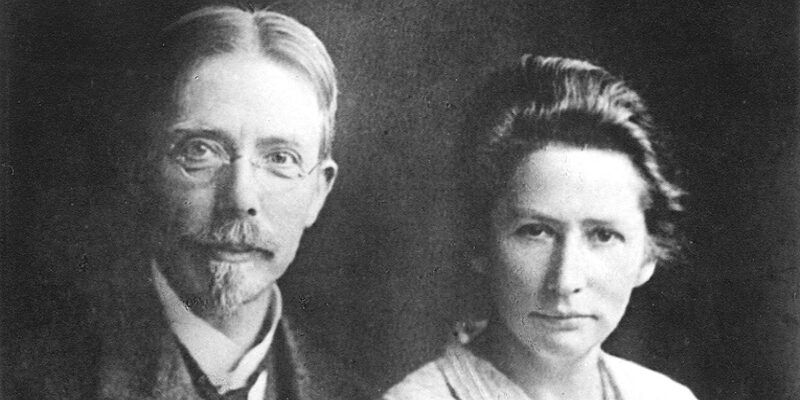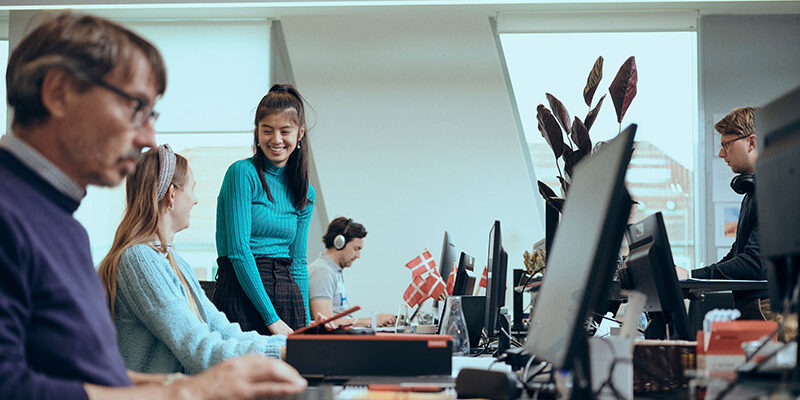The Novo Nordisk Foundation has supported Danish life sciences for almost 100 years, maintaining knowledge, technology, talent and companies in the region.
You can not really speak about life sciences in Denmark without mentioning its large industrial foundations and how they have benefited the industry. These long-term investors have benefited both the pharma and biotech industries; industries known for their long development times.
“As long-term owners of companies, the foundations enable these companies to plan long term. This helps to create a stable operating environment and ensure important strategic development. Foundation ownership also protects the companies from takeovers, as has happened to life science companies in Sweden for example. This ensures that important knowledge, technology, production and talented employees continue to contribute to developing Danish society,” explains Steffen Lüders, Senior Vice President, Communication at the Novo Nordisk Foundation (NNF).
“Foundation ownership also protects the companies from takeovers, as has happened to life science companies in Sweden for example.”
Together with the Lundbeck Foundation, Dr. Frederik Paulsen Foundation, and the LEO Foundation, NNF controls the ownership of Denmark’s largest life science companies, Novo Nordisk, Lundbeck, Ferring and LEO Pharma.

Steffen Lüders, Senior Vice President, Communication, the Novo Nordisk Foundation
“We are an independent Danish foundation with corporate interests. We have two overall objectives. The first is to provide a stable basis for the commercial and research activities of the companies in the Novo Group, which are Novo Nordisk A/S and Novozymes A/S. The second is to support scientific, humanitarian and social causes through our grant-giving activities,” says Lüders.
It started with a Nobel Laureate …
The Novo Nordisk Foundation dates back to 1922, when the Nobel Laureate August Krogh returned home from the US and Canada with permission to produce insulin in the Nordic countries. Right from the start the founders placed the company and its responsibilities in a foundation structure, called the Nordisk Insulin Foundation, and it was stated that the profit from the sale of diabetes medicine would be used for scientific and humanitarian purposes.

August (1874-1949) and Marie Krogh (1874-1943). August Krogh a professor at the University of Copenhagen, received the Nobel Prize in physiology in 1920. His wife, Marie Krogh, was a doctor and a researcher in metabolic diseases.
However, just a few years later, in 1924, as a result of a disagreement, one of the employees, Thorvald Pedersen, was fired. This led to his brother, Harald Pedersen, resigning as well, and the two brothers then established their own insulin company, Novo Terapeutisk Laboratorium. Over subsequent decades the two companies were rivals, and in 1951 the Pedersen brothers also established a foundation, called the Novo Foundation.
In 1989, the Boards of the foundations agreed to merge the two foundations into the Novo Nordisk Foundation. Merging the foundations allowed one foundation to exercise the controlling interest in Novo and Nordisk, which thereby enabled the two companies to merge into Novo Nordisk A/S.
Three years later the NNF became an independent actor with its own management and administration, but it was not until 1999–2000 the foundation stepped into the limelight in its own right, as a result of major changes in the Novo Group. The company was split into two, one for healthcare, which retained the name Novo Nordisk A/S, and one for the enzyme business, which became Novozymes A/S. Separate boards with new members for the two companies were established and the NNF also established a wholly owned subsidiary, Novo A/S, to manage the foundation’s interests in the two operating companies, to maintain a stable basis for the companies and to ensure sufficient income for the foundation’s grant activities.
At the heart of our work
Since then the NNF has awarded over 12,000 grants for research and other purposes benefiting the society, and Steffen Lüders emphasizes that the freedom and independence of research is very much respected – meaning that all grants come with full research and publishing freedom and they never ask for any rights or IP. “The freedom of research is very much at the heart of our work,” he says.
When awarding grants, the NNF considers many aspects and when asked to highlight some of the most significant Lüders cites, ”Excellence, where the Foundation aims to pursue the highest standard of quality in all we support, interdisciplinarity, where we strive to facilitate connectivity across disciplines to generate new ways to discovery, and collaboration, which is about facilitating inclusiveness and collaboration to catalyze advances in national and international partnerships.”
“In 2019, we supported 4,100 jobs in science, fully or partly, and 2,800 new publications have been released as a result of our support.”
Besides awarding grants, the NNF has also established several life science centers, initiated and enabled national and international projects, and they also award several prizes each year. “In 2019, we supported 4,100 jobs in science, fully or partly, and 2,800 new publications have been released as a result of our support,” says Lüders.
He and his colleagues recently published a report in which they analyzed and measured the impact of research projects the NNF has supported. For example, last year 9.5% of the country’s public research was funded by the Foundation and DKK 4.9 billion in grants were awarded. Eleven new spinouts were created and 1,780 PhDs and postdocs were supported by the foundation.
Next generation life science companies
The purpose of the NNF is also to build bridges between scientific discoveries and their commercial applications. One of the most recent major innovation initiatives was the establishment of the BioInnovation Institute (BII), an international hub in Copenhagen for research-based innovation and entrepreneurship founded in December 2017. The main focus of the Institute is interdisciplinary ideas in medical technology, pharma and biotechnology, and it offers modern facilities, various funding opportunities and partnerships and programs with technical, scientific and commercial experts. Since its inception the BII has provided 85 start-ups with funding totaling EUR 48 million.
In December 2020, the NNF also announced that it will establish the BII as an independent charitable, commercial foundation. By doing so, the NNF will continue its interest in the initiative while opening it up for other organizations and foundations to take part in its long-term financing.
“We see great potential to develop new solutions in life science and biotechnology, but good ideas often need support from an early stage of development to become mature and prepared for commercialization in order to benefit people and societies. That is why BII’s task is so important,” said Birgitte Nauntofte, former CEO of the Novo Nordisk Foundation. Nauntofte was CEO of NNF between 2009 and March 2021.
Read more: He is the new CEO of the Novo Nordisk Foundation
To date the NNF has awarded EUR 64 million to BII. With continued positive development, the NNF can provide up to EUR 470 million to the BII Foundation over 10 years. The BII expects to house up to 500 researchers, innovators and entrepreneurs over the coming years and will increasingly focus on attracting international life science entrepreneurial talent to Denmark. The BII also expects to raise the profile of Nordic innovation ecosystem for the international life science investment community, the NNF states.
”BII already has a strong collaboration with universities and hospitals, and we have received a large number of very high quality applications for our programs. This testifies to there being immense potential for more projects and start-ups, with much to build on in the coming years,” says Jens Nielsen, professor and CEO of the BII Foundation.

Jens Nielsen, professor and CEO of the BII Foundation
”I have a strong belief in the mission of BioInnovation Institute and great respect for Jens Nielsen. I know from the US how transformational an initiative of this size can be to the life science ecosystem and as Chair of BII’s Scientific Advisory Board I look forward to taking part in this journey,” says MIT-professor Robert Langer, the most cited engineer in the world and who has transformed his own laboratory discoveries into numerous products by founding companies such as Momenta, PureTech, and Moderna.
In open competition, entrepreneurs can apply for financing and business development through BII’s programs. The Creation House program offers business development, access to BII’s international entrepreneurial culture, office space and laboratory area in Copenhagen, plus a low-risk convertible loan of up to EUR 1.3 million for each high-growth start-up company.
Another branch of the NNF’s activities is its fully-owned subsidiary Novo Holdings, enabling investments in life science companies at all stages of development, and assisting the companies with both capital and knowhow.
“We primarily focus on investing in Europe and the United States, and we think about the life science sector as a group of diversified subsectors, including biotechnology, medical technology, healthcare IT, pharmaceuticals, healthcare services, bioindustrials and payers and providers,” says Lüders.
Efforts during the pandemic
Just like all industries, the Danish life science industry has been affected by the ongoing COVID-19 pandemic. When it comes to academia, researchers’s ability to pursue their research was significantly affected, particularly during the lock-down period with reduced access to lab space, test facilities and employees, notes Lüders “We have been very responsive to this and allowed for extensions of the funding periods for the grant holders. We have also observed a shift from physical to online meetings among the granted initiatives, and we have seen impressive efforts to create new online platforms and forums in very short time periods.”
“To keep the momentum in the life science sector we therefore need to ensure that new financing instruments and investments are established in Denmark, as well as a support system for establishment of new public-private partnerships.”
In addition, many companies in the life science sector are small and vulnerable to the reduced number of investment deals seen during the pandemic. Moreover, clinical trials have been significantly affected, with either halted initiation of new studies or reduced recruitment of patients.

The BioInnovation Institute
“To keep the momentum in the life science sector we therefore need to ensure that new financing instruments and investments are established in Denmark, as well as a support system for establishment of new public-private partnerships,” emphasizes Lüders. “The pandemic has shown us that collaborations between academia, healthcare, governmental initiatives, foundations and industry are a central factor for development and longevity of the life science sector, as well as for effectively fighting the pandemic.”
He also says that the pandemic has highlighted the possibilities there are in utilization of the vast amount of Danish and Nordic health data. “The NNF has a particular focus on supporting the infrastructure within this field through our strategic initiatives and granting tools, and in this way accelerates clinical innovation in Denmark.”
“In the fall of 2020, DKK 40 million was allocated for a program supporting research into the long-term health consequences of COVID-19 illness.”
The NNF is supporting a large number of projects and initiatives in relation to combatting COVID-19, and so far they have awarded grants for this purpose totaling around DKK 416 million.
“This includes DKK 250 million to Statens Serum Institut (SSI) in connection with the establishment of Testcenter Danmark, a national COVID-19 test centre, DKK 20 million for the development of two new antibody tests, as well as DKK 82.5 million for 45 projects that aim to mitigate the short-term health-related effects of the COVID-19 epidemic across the Danish Realm. In the fall of 2020, DKK 40 million was allocated for a program supporting research into the long-term health consequences of COVID-19 illness,” says Lüders. “In addition we have awarded DKK 14.4 million for 15 international initiatives that can mitigate the consequences of the COVID-19 pandemic in areas of the world where there are many refugees.”
Remaining at the forefront
Danish life science is best known for its large pharmaceutical companies, but also has an increasing number of strong SMEs with a focus on medical applications, for example in the fields of metabolism, endocrinology, cancer research, inflammatory and infectious diseases, CNS and industrial biotech. Many of these companies originate from life science research at the Danish Universities with world-class research facilities and highly skilled scientists, in combination with one of the best data collection systems in the world, notes Lüders
“The collaborative efforts between Danish universities and life science companies clearly strengthens the joint research projects and improves their competitiveness. This cross fertilization between Danish academia and industry is one of Denmark’s key strengths and one of the main opportunities to develop an even stronger life science ecosystem.”
“An area in need of improvement is ensuring the establishment of new platforms that can facilitate an increased collaboration between industry and academia to reduce the “Not invented here-culture”.”
“An area in need of improvement is ensuring the establishment of new platforms that can facilitate an increased collaboration between industry and academia to reduce the “Not invented here-culture”,” says Lüders. “Also, we need to further strengthen the Danish life science brand internationally to attract foreign researchers, business experts and investments to Denmark. We need to ensure that life science companies have favorable conditions to grow in Denmark, to reduce the risk that they would establish in or relocate themselves to other countries.”
He concludes that both Denmark and the Nordics need to continue building a strong innovation ecosystem, and create an essential flow in the system that will help the researchers to accelerate the process from scientific discovery to final product.
“We need to support academic researchers at the universities and clinics with research funding and mentoring from business and industry experts, as well as access to infrastructure and networks. We also need to continue the development of the support system at the later innovation stages in order to fully develop the commercial potential of Danish research projects. This should be ensured by giving the researchers and entrepreneurs increased access to international experts and increased funding from venture capital investments.”
This article was originally published in issue 01 2021 of our magazine (out February 2021)







